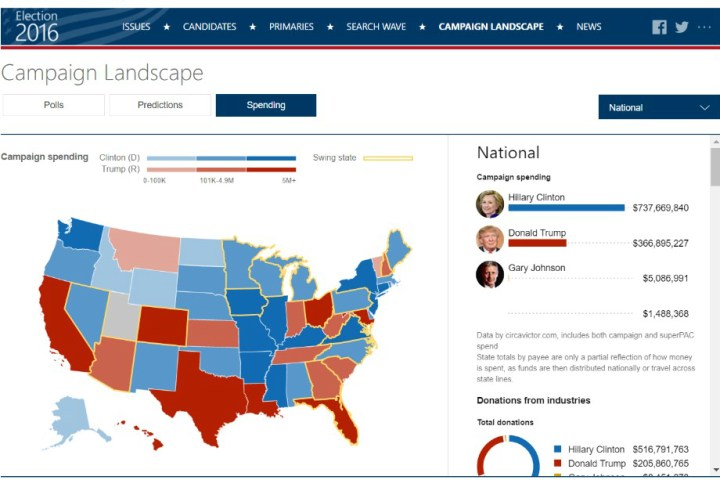
Microsoft’s Bing search engine has been working overtime to keep its users informed and updated, often in real time, and the team is releasing a new Campaign Landscape feature to make things even easier, according to a blog post this morning. The Campaign Landscape will be focused on keeping voters up to date on a number of specific data points as we head into the election on November 8.
Related: Google has its own election hub
First up are predictions for which candidates will win each state. The presidential race will be covered first, and Bing will be adding congressional forecasts in the near future along with a balance-of-power overview. State-by-state poll results will also be provided. As with everything in the Campaign Landscape, this information will be updated in real time.

Next is a map view of candidate spending on a state-by-state basis. Information will also be provided on the source and amounts of money raised by each candidate from key donors nationally, such as Super PACs and industry groups.

Finally, voters will be able to compare their own choices with those of people who most resemble them. Bing will be providing demographic breakdowns on voter preferences, and laying everything out on a map to see how age and gender preferences vary on a state level.
Bing also provides a news hub on the elections experience homepage to help voters access trending news across a number of sources. The Bing team will be selecting stories from a diverse group of media outlets. If you’re looking for a place to live stream the final presidential debate, then you can search “presidential debate” for places to watch.

While today’s political landscape is noteworthy for its unusually rancorous nature, voters do benefit from access to a host of different news sources that can help them dig up the information they need to make educated voting choices. The Bing Campaign Landscape is just one effort to help voters make sense of the data and the unending litany of trending news that can help inform — or confuse — their decisions.


